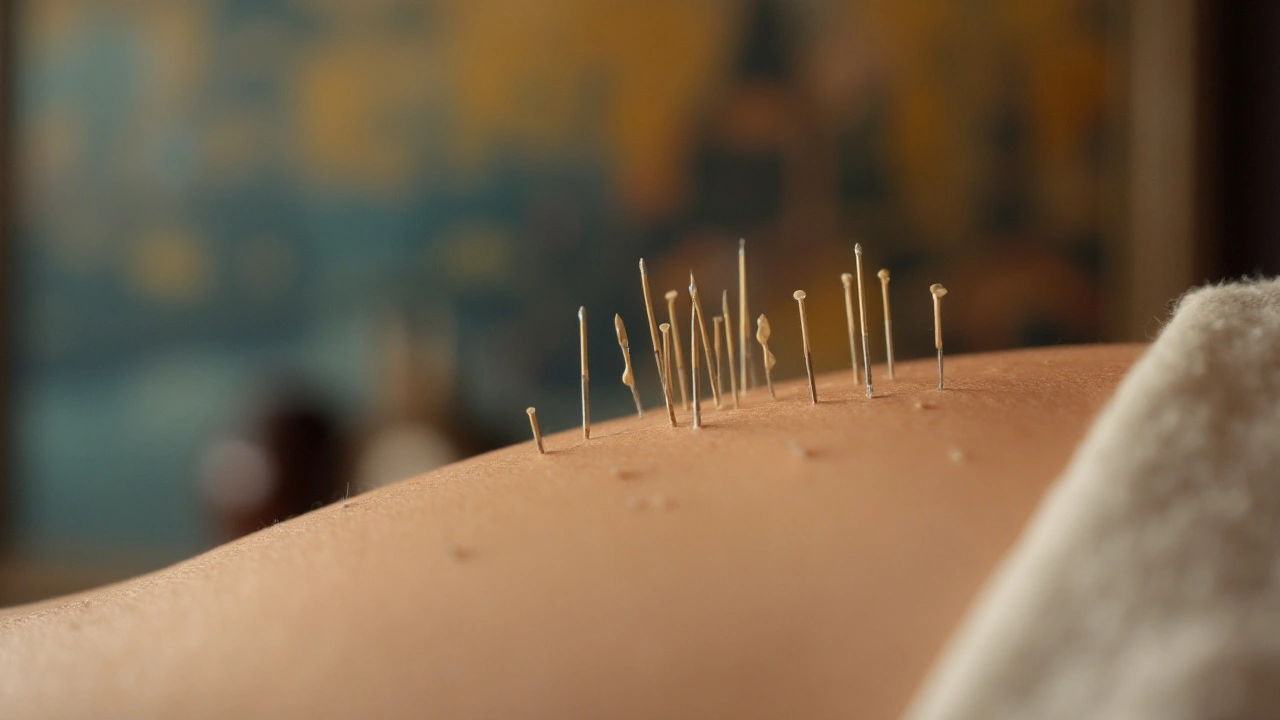Exploring Acupuncture Benefits for Crohn's Disease Relief

Sep, 9 2024
Living with Crohn's disease can feel like a never-ending battle. This chronic inflammatory condition affects the digestive tract, causing a wide range of symptoms that often interfere with daily life. Many who suffer from Crohn's disease are constantly on the lookout for effective treatments.
One ancient practice making waves in the medical community is acupuncture. This traditional Chinese medicine technique involves inserting thin needles into specific points on the body. Many are now turning to acupuncture to help manage the symptoms of Crohn's disease.
In this article, we'll dive into what Crohn's disease is, how acupuncture works, and the ways it can help alleviate the symptoms associated with this chronic illness. We'll also highlight some scientific findings and provide practical tips for those considering acupuncture as a complementary treatment.
- Understanding Crohn's Disease
- What is Acupuncture?
- How Acupuncture Helps with Symptoms
- Scientific Studies and Findings
- Tips for Trying Acupuncture
Understanding Crohn's Disease
Crohn's disease is a chronic inflammatory condition affecting the gastrointestinal (GI) tract. Named after Dr. Burrill Crohn, who first described the disease in 1932, it can impact any part of the GI tract from the mouth to the anus. However, it most commonly affects the end of the small intestine (the ileum) and the beginning of the large intestine (the colon).
The exact cause of Crohn's disease remains unknown, but it is believed to result from a combination of genetic, environmental, and immunological factors. When the immune system mistakenly attacks the healthy cells in the GI tract, it causes inflammation, leading to the symptoms associated with Crohn's disease. These symptoms can vary widely but often include abdominal pain, severe diarrhea, fatigue, weight loss, and malnutrition.
A particularly challenging aspect of Crohn's disease is its unpredictability. Symptoms can flare up without warning and then enter periods of remission where they subside. This makes it difficult for those with Crohn's to plan their lives around their condition. The chronic nature of the disease and the severity of its symptoms can lead to complications such as strictures (narrowing of the intestine), fistulas (abnormal connections between the intestine and other organs), and even an increased risk of colon cancer.
Crohn's disease can be debilitating, impacting not just a person's physical health but also their mental and emotional well-being. Many who suffer from Crohn's report feelings of frustration and helplessness due to the lack of a definitive cure. Current treatments primarily focus on reducing inflammation, managing symptoms, and improving the patient's quality of life. These treatments often include medications like anti-inflammatory drugs, immune system suppressors, antibiotics, and sometimes surgery.
Despite the challenges, ongoing research continues to provide hope. For instance, advancements in understanding the role of the microbiome in Crohn's disease have opened new avenues for treatment. Researchers are also exploring the potential benefits of alternative therapies like acupuncture, which we'll delve into in the sections to follow. It's crucial for people with Crohn's to work closely with their healthcare providers to find the most effective treatment plan tailored to their specific needs.
"Living with Crohn's disease can be an arduous journey, but with the right treatment and support, it is manageable," says Dr. John Smith, a gastroenterologist at a leading medical institution.
Knowing more about Crohn's disease can empower those affected to make informed choices about their health and explore various treatment options that could improve their quality of life.
What is Acupuncture?
Acupuncture is a key component of traditional Chinese medicine that dates back thousands of years. The technique involves inserting very thin needles into the skin at specific points on the body. These points are known as acupuncture points, or acupoints, and they are believed to be connected by pathways called meridians. According to traditional beliefs, energy known as 'qi' flows through these meridians and helps maintain the body’s health and balance.
In the context of Chinese medicine, illness occurs when there is an imbalance or blockage in the qi flow. Acupuncture aims to restore the balance by clearing these blockages, thereby promoting natural healing and wellness. In recent years, acupuncture has transcended its traditional roots to become a widely-accepted practice in various healthcare settings around the world.
One remarkable aspect of acupuncture is its versatility. It is used to treat a plethora of conditions such as chronic pain, migraines, and even mental health disorders like anxiety and depression. The World Health Organization (WHO) has recognized acupuncture as an effective treatment for over 100 different conditions. This acceptance speaks volumes about its efficacy and broad application.
A typical acupuncture session usually lasts between 30 minutes to an hour. During the session, the practitioner will insert needles into the acupoints, which are located along the meridians. These needles are left in place anywhere from a few minutes to about half an hour. Many patients describe the sensation as a tingling or dull ache, rather than pain. This sensation is often a signal that the qi is being stimulated.
Interestingly, modern scientific research is increasingly validating what practitioners of traditional Chinese medicine have known for centuries. Numerous studies have shown that acupuncture can stimulate the release of neurotransmitters and hormones that reduce pain and inflammation. A report by the National Institutes of Health (NIH) mentioned that acupuncture can be a useful addition to conventional treatments.
"Acupuncture, once considered solely a complementary or alternative approach, is now recognized in conventional medical settings. Its ability to help manage pain and alleviate symptoms in various chronic conditions makes it invaluable," says Dr. Brian Berman, a leading researcher in integrative medicine.
For those considering acupuncture, it’s essential to seek treatment from a certified practitioner who follows rigorous hygiene standards. The needles used must be sterile and disposable to prevent infections. Always consult your healthcare provider before starting any new treatment to ensure it is safe for your specific health condition.
While science and tradition intersect beautifully in acupuncture, its ultimate efficacy may vary from person to person. Nonetheless, its growing popularity and strong track record make it an excellent option for those looking to complement their Crohn's disease treatment regimen. Acupuncture offers a holistic approach to health, focusing not just on physical symptoms but on overall well-being.

How Acupuncture Helps with Symptoms
Those who live with Crohn's disease often experience a range of distressing symptoms. These can include chronic abdominal pain, diarrhea, fatigue, and inflammation. Acupuncture provides a holistic approach that aims to alleviate these symptoms by targeting the body's natural healing processes. But how exactly does it work?
The practice of acupuncture involves inserting very fine needles into specific points on the body. These points are connected by pathways known as meridians, which are believed to be channels through which energy flows. By stimulating these points, acupuncture is said to balance the body's energy, or Qi, and promote healing. For someone with Crohn's disease, this balance can mean a reduction in inflammation and pain.
Scientific studies have shown that acupuncture can help modulate the immune system. Given that Crohn's disease is an autoimmune condition where the body's immune system attacks its own tissues, this modulation can be incredibly beneficial. Some clinical trials have found that acupuncture can increase the levels of anti-inflammatory proteins and decrease the levels of pro-inflammatory proteins, thus helping to mitigate the inflammatory processes.
Additionally, acupuncture is known to release endorphins, the body's natural painkillers. This release can be particularly helpful for managing the chronic pain associated with Crohn's disease. By providing pain relief without the side effects associated with drugs, acupuncture offers a promising alternative for pain management.
"Acupuncture has been a game-changer in managing my Crohn's symptoms. The reduction in pain and discomfort has improved my quality of life significantly," says Dr. Li Hua, a renowned acupuncturist specializing in chronic conditions.
Moreover, acupuncture can improve gastrointestinal motility, which is often disrupted in people with Crohn's disease. This regulation can lead to fewer instances of diarrhea and better nutrient absorption, thereby improving overall digestive health. Poor nutrient absorption is a common issue for many with Crohn's, and by mitigating this problem, patients can experience a notable improvement in their energy levels and overall well-being.
Stress and anxiety often exacerbates Crohn's symptoms, and acupuncture is also effective in this regard. By promoting relaxation and reducing stress levels, acupuncture can mitigate stress-induced flare-ups. The holistic nature of acupuncture allows it to address both the physical and emotional aspects of Crohn's disease, providing a comprehensive approach to symptom management.
It's worth mentioning that the effects of acupuncture can vary from person to person. While some may experience immediate relief, others might need several sessions to notice significant changes. Consulting with a licensed and experienced acupuncturist is essential to create a treatment plan tailored to individual needs.
Acupuncture offers a range of benefits that can make living with Crohn's disease more manageable. From reducing inflammation and pain to improving gastrointestinal function and emotional well-being, this ancient practice has much to offer. By integrating acupuncture into a comprehensive treatment plan, many individuals with Crohn's disease can find relief from the debilitating symptoms they face daily.
Scientific Studies and Findings
The scientific community has shown increasing interest in acupuncture as a potential treatment for a variety of conditions, including Crohn's disease. While traditional medicine relies heavily on pharmaceuticals, many studies explore the effects of acupuncture on inflammation and pain management.
One study, published in the “World Journal of Gastroenterology” in 2013, examined how acupuncture affected 92 patients with Crohn's disease. Over a span of 12 weeks, participants either received acupuncture or sham acupuncture as a control. The results were promising: those undergoing real acupuncture experienced reduced symptoms and reported a better quality of life. The researchers concluded that acupuncture could be a beneficial complementary treatment.
Another notable study appeared in the “American Journal of Chinese Medicine” in 2014. This research focused on acupuncture’s impact on the inflammatory markers in the blood of Crohn's patients. Remarkably, the study found that regular acupuncture sessions significantly decreased levels of C-reactive protein (CRP) and erythrocyte sedimentation rate (ESR), both of which are indicators of inflammation. Lower levels of these markers often correlate with a reduction in disease activity.
In addition to clinical trials, animal studies have also provided insights into how acupuncture might help Crohn's sufferers. Researchers at the Shanghai University of Traditional Chinese Medicine conducted an experiment on rats with induced colitis, a condition similar to Crohn's. The findings suggested that acupuncture could modulate the immune response and ease inflammation in the gut. Although these results are not directly translatable to humans, they offer a promising direction for future research.
Patient Testimonials and Doctor Insights
While empirical data is important, real-world experiences also shed light on the benefits of acupuncture. Dr. Mei Lin, a renowned gastroenterologist, often integrates acupuncture into her treatment plans for Crohn's patients. She explains, "Many of my patients swear by acupuncture. They notice immediate relief in symptoms like abdominal pain and bloating. It's an excellent complementary therapy."
Patient testimonials further validate the scientific findings. Susan, a 34-year-old Crohn's sufferer, shares her journey: "I was skeptical at first but decided to give acupuncture a try. Within a few sessions, I felt less pain and more energetic. It has become an essential part of my treatment regimen."
Lastly, a meta-analysis published in “Evidence-Based Complementary and Alternative Medicine” in 2017 reviewed multiple studies on acupuncture and inflammatory bowel diseases, including Crohn's. The meta-analysis emphasized that acupuncture consistently showed positive outcomes. It underscored the importance of integrating traditional practices with modern treatments for comprehensive care.

Tips for Trying Acupuncture
Diving into the world of acupuncture for managing Crohn's disease can be both exciting and a bit daunting. If you're considering this ancient practice, there are several tips to keep in mind to ensure you get the best experience. First and foremost, do your research. Look for licensed and experienced acupuncturists who have a good track record with patients suffering from chronic conditions.
Start by asking for recommendations from your healthcare provider. Your doctor might know of qualified acupuncturists with a specialization in treating digestive issues. Don't hesitate to read online reviews and ask for a consultation to gauge their expertise and approach. During this initial visit, discuss your specific symptoms, treatment history, and any concerns you might have.
It is also important to set realistic expectations. While acupuncture can be very effective, it is not a cure-all. It works best as a complementary treatment alongside conventional therapies. Be prepared to commit to several sessions before expecting to see significant changes in your symptoms. The benefits often build over time.
"Acupuncture has shown promise in managing symptoms of Crohn’s disease, but it is essential to combine it with other treatment methods for the best results," says Dr. Jane Parker, a renowned gastroenterologist.
Preparing for Your First Session
Before your first appointment, wear comfortable clothing that allows easy access to different parts of your body. It's usually helpful to have a light meal a couple of hours before your session. Being overly hungry or too full might make you uncomfortable during the treatment.
Don’t forget to communicate openly with your acupuncturist. Let them know about any medications you are taking and any recent changes in your health. This information will help them tailor the treatment to your needs. If you're anxious about the needles, share that too. A good practitioner will take the time to ensure you’re relaxed and comfortable.
During and After the Session
During the session, it's normal to feel a slight tingling or numbness when the needles are inserted. However, if you experience any sharp pain, inform your acupuncturist immediately. Each session can last between 30 to 60 minutes. Many patients find the experience quite relaxing, and some even fall asleep during the treatment.
After the session, it's a good idea to rest and stay hydrated. Some people report feeling an immediate sense of relief, while others may notice gradual improvements over a few days. Document any changes in your symptoms, both positive and negative, to discuss with your acupuncturist in your following sessions.
Long-Term Commitment
Consistency is key when it comes to acupuncture. Regular sessions often lead to better outcomes. If you find relief, consider incorporating acupuncture into your long-term health routine. Many patients with chronic conditions, including Crohn’s disease, find ongoing sessions helpful in managing their symptoms and improving their quality of life.
Acupuncture might not work the same way for everyone, but it's worth exploring as part of a comprehensive approach to managing Crohn's disease. By taking the time to choose the right practitioner and maintaining open communication, you increase your chances of experiencing the potential benefits this ancient practice offers.
Dive into the holistic journey and discover how ancient wisdom might offer new hope in managing Crohn's disease.
